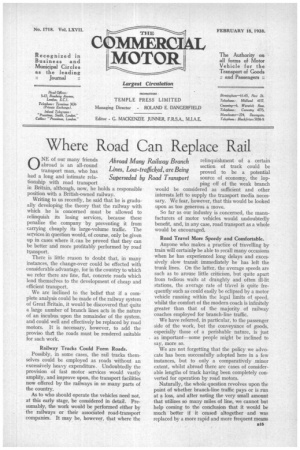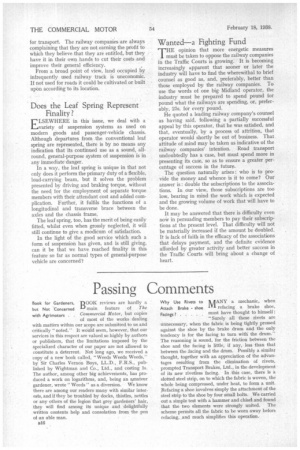Where Road Can Replace Rail
Page 25

Page 26

If you've noticed an error in this article please click here to report it so we can fix it.
NE of our many friends abroad is an all-round transport man, who has had a long and intimate relationship with road transport in Britain, although, now, he holds a responsible position with a British-owned railway.
Writing to us recently, he said that he is gradually developing the theory that the railway with which he is concerned must be allowed to relinquish its losing services, because these penalize the company by preventing it from carrying cheaply its large-volume traffic. The services in question would, of course, only be given up in cases where it .can be proved that they can be better and more profitably performed by road transport.
There is little reason to doubt that, in many instances, the change-over could be effected with considerable advantage, for in the country to which we refer there are fine, flat, concrete roads which lend themselves to the development of cheap and efficient transport.
We are inclined to the belief that if a complete analysis could be made of the railway system of Great Britain, it would be discovered that quite a large number of branch lines acts in the nature of an incubus upon the remainder of the system, and could well and effectively be replaced by road motors. It is necessary, however, to add the proviso that the roads must be rendered suitable for such work.
Railway Tracks Could Form Roads.
Possibly, in some cases, the rail tracks themselves could be employed as roads without an excessively heavy expenditure. Undoubtedly the provision of fast motor services would vastly amplify, and improve upon, the transport facilities now offered by the railways in so many parts of the country.
As to who should operate the vehicles need not, at this early stage, be considered in detail. Presumably, the work would be performed either by the railways or their associated road-transport companies. It may be, however, that where the relinquishment of a certain section of track could be proved to be a potential source of economy, the lopping off of the weak branch would be considered as sufficient and other interests left to supply the transport media necessary. We fear, however, that this would be looked upon as too generous a move.
So far as our industry is concerned, the manufacturers of motor vehicles would undoubtedly benefit, and, in any case, road transport as a whole would be encouraged.
Road Travel More Speedy and Comfortable.
Anyone who makes a practice of travelling by train will certainly be able to recall many occasions when he has experienced long delays and excessively slow transit immediately he has left the trunk lines. On the latter, the average speeds are such as to arouse little criticism, but quite apart from tedious waits at draughty and often stations, the average rate of travel is quite frequently such as could easily be eclipsed by a motor vehicle running within the legal limits of speed, whilst the comfort of the modern coach is infinitely greater than that of the majority of railway coaches employed for branch-line traffic.
We have referred, in particular, to the passenger side of the work, but the conveyance of goods, especially those of a perishable nature, is just as important—some people might be inclined to say, more so.
We are not forgetting that the policy we advocate has been successfully adopted here in a few instances, but to only a comparatively minor extent, whilst abroad there are cases of considerable lengths of track having been completely converted for operation by road motors.
Naturally, the whole question revolves upon the point of whether branch-line traffic pays or is run at a loss, and after noting the very small amount that utilizes so many miles of line, we cannot but help coming to the conclusion that it would be much better if it ceased altogether and was replaced by a more rapid and more frequent means for transport. The railway companies are always complaining that they are not earning the profit to which they believe that they are entitled, but they have it in their own hands to cut their costs and improve their general efficiency. From a broad point of view, land occupied by infrequently used railway track is uneconomic. If not used for roads it could be cultivated or built upon according to its location.
Does the Leaf Spring Represent Finality?
ELSEWHERE in this issue, we deal with a variety of suspension systems as used on modern goods and passenger-vehicle chassis. Although departures from the conventional leaf spring are represented, there is by no means any indication that its continued use as a sound, allround, general-purpose system of suspension is in any immediate danger.
In a way, the leaf spring is unique in that not only does it perform the primary duty of a flexible, load-carrying beam, but it solves the problem presented by driving and braking torque, without the need for the employment of separate torque members with their attendant cost and added complication. Further, it fulfils the functions of a longitudinal and transverse brace between the axles and the chassis frame.
The leaf spring, too, has the merit of being easily fitted, whilst even when grossly neglected, it will still continue to give a modicum of satisfaction.
In the light of the good service which such a form of suspension has given, and is still giving, can it be that we have reached finality in this feature so far as normal types of general-purpose vehicle are concerned?
Wanted—a Fighting Fund
THE opinion that more energetic measures must be taken to oppose the railway companies in the Traffic Courts is growing. It is becoming increasingly apparent that sooner or later the industry will have to find the wherewithal to brief counsel as good as, and, preferably, better than those employed by the railway companies. To use the words of one big Midland operator, the industry must be prepared to spend pound for pound what the railways are spending, or, preferably, 25s. for every pound.
He quoted a leading railway company's counsel as having said, following a partially successful appeal by this operator, that he was satisfied, and that, eventually, by a process of attrition, that operator would shortly be out of business. That attitude of mind may be taken as indicative of the railway companies' intention. Road transport undoubtedly has a case, but must spend more in presenting its case, so as to ensure a greater percentage of success in the future.
The question naturally arises : who is to provide the money and whence is it to come? Our answer is : double the subscriptions to the associations. In our view, those subscriptions are too low, bearing in mind the work which is expected and the growing volume of work that will have to be done.
It may be answered that there is difficulty even now in persuading members to pay their subscriptions at the present level. That difficulty will not be materially increased if the amount be doubled. It is lack of faith in the efficacy of the associations that delays payment, and the definite evidence afforded by greater activity and better success in the Traffic Courts will bring about a change of heart.




















































































